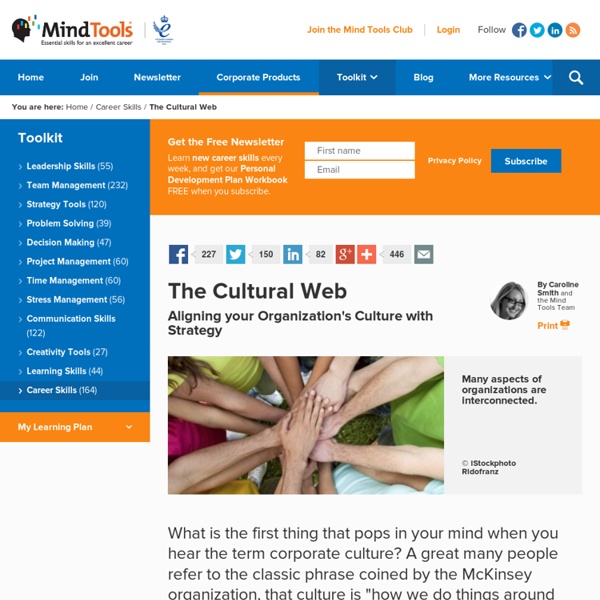Leadership information for charities and non profit organisations - Changing organisational culture
How to define, identify and review an organisation's culture. How do you go about changing the way things are done in an organization? Much of this is down to organizational culture. Defining organisational culture Organisational culture are the habits and accepted norms that underpin how we work and what is and isn’t acceptable in our workplaces. So for one team it might be usual dress informally or socialize together. Identifying organisational culture Here are some of the key indicators of an organisation's culture: What did you notice most when you first joined the organisation? The cultural web below is a way of identifying culture. Different Types of Culture There are many different ways of describing culture. Power culture: This is where there is a strong central figure, for example, entrepreneurial start ups or where a charismatic founder has developed the organisation. Role culture: Government departments are typically a role culture. Changing organisational culture Useful links
Google Chrome, Chromium, and Google
A number of people have asked about the relationship between Google Chrome, Chromium, and Google, specifically in regards to what data is sent to Google or other providers. This is meant to provide a complete answer to that question, and as you will see below, almost all such communication can be disabled within the options of the product itself. Before getting too deep into the question though, it is helpful to have a common set of terminology. Chromium is the name we have given to the open source project and the browser source code that we released and maintain at www.chromium.org. Communications between Chromium (and Google Chrome) and service providers Search Suggest: If you type a few letters into the address bar and pause, Google Chrome will send the letters you have typed to your default search provider so it can return a list of suggestions. If you choose to accept a search query suggestion, that query will be sent back to your search provider to return a results page.
Education Competencies
Level 100: Microsoft Digital Literacy This curriculum, available both online and offline, helps educators develop a fundamental understanding of computers and productivity software. These courses help them get the essential skills they need to begin computing with confidence. The Standard Curriculum features five courses that cover computer basics: Using the Internet, Using Productivity Programs, Security, Privacy and Digital Lifestyles. The Advanced Curriculum features four courses, including Creating an Email Account, Creating a Great Resume, Searching for Content on the Web, and Social Networking. While not specific to the education context, the Microsoft Digital Literacy curriculum can be a great place to start when new to computing or to productivity applications. Level 200: Teaching with Technology Optional Microsoft Certified Educator Exam The MCE exam is a valid and reliable global assessment of educator ICT competencies. Level 200: Microsoft Certified Educator
Tendance du webdesign : Windows 8/Metro UI
Bien avant sa sortie officielle en octobre dernier, le web c’était déjà approprié le design Metro de Microsoft. On parle aujourd’hui de style Metro, avec sa philosophie et ses caractéristiques propres. Peut-il devenir une véritable tendance du webdesign dans les mois à venir ? Annoncé il y a plus d’un an avec la présentation de Windows 8, Metro a déjà fait couler beaucoup de pixels sur le web. Cette interface va-elle faire le poids ? Les utilisateurs vont-ils se faire à cette nouvelle architecture ? Metro, boulot… ? Metro c’est quoi au juste ? L’univers Metro est reconnaissable par quatre caractéristiques fondamentales : la typographie, la mouvement, la mise en page de type grille et la simplicité. Découvrons comment elles se définissent et comment ses codes sont retranscrit sur le web aujourd’hui. La typographie : Principe de base de l’interface, la typographie est mise au cœur de l’ergonomique. Le mouvement Grille : Simplicité : L’esprit Metro sur le web Pour conclure
National College online network
On 1 April, the National College merged with the Teaching Agency to become the National College for Teaching and Leadership. The new agency has two key aims: improving the quality of the workforce; and helping schools to help each other to improve. Find out more about the new agency. We can help you to develop as a leader and achieve your career goals. Whether you're taking on your first leadership role or are an experienced and successful school or children's centre leader, we have something for you. We also offer professional development for chairs of governors and school business managers. Professional development opportunities One of the most powerful ways of achieving improvement is through collaboration and we offer many opportunities for school and early years leaders to provide and receive support. Find out about becoming a teaching school or being designated as a national, local or specialist leader of education. Support for schools and early years
Patron de conception
Un article de Wikipédia, l'encyclopédie libre. Pour les articles homonymes, voir Patron. En informatique, et plus particulièrement en développement logiciel, un patron de conception (en anglais : design pattern) est un arrangement caractéristique de modules, reconnu comme bonne pratique en réponse à un problème de conception d'un logiciel. Il décrit une solution standard, utilisable dans la conception de différents logiciels[1]. Les patrons de conception décrivent des procédés de conception généraux et permettent en conséquence de capitaliser l'expérience appliquée à la conception de logiciel. Les types de patrons[modifier | modifier le code] Les patrons de conception ne sont ni des patrons d'architecture ni des idiotismes de programmation. Description[modifier | modifier le code] Les patrons servent à documenter des bonnes pratiques basées sur l'expérience. Histoire[modifier | modifier le code] Citations[modifier | modifier le code] Formalisme[modifier | modifier le code] Adapter Bridge Builder
Preparation makes perfect



